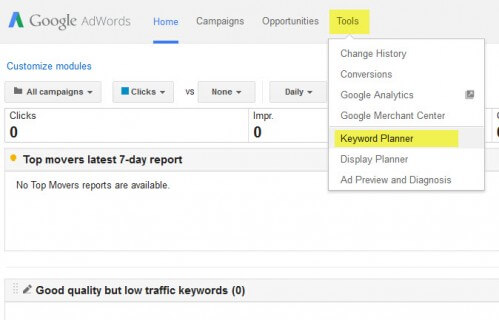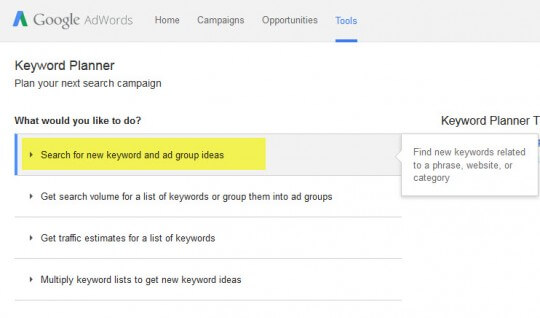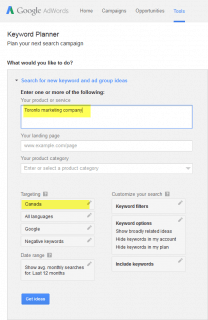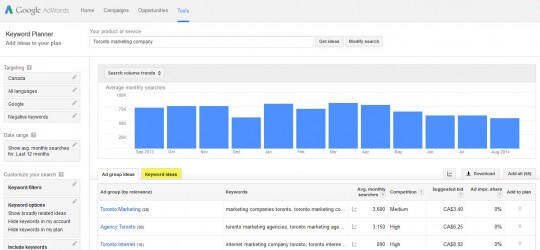Using a keyword search tool to create great blog post ideas
October 30, 2014

Not sure what to write about? Begin by conducting keyword research to identify topics that align with your SEO strategy.
By Maureen McCabe
If you maintain a blog on your small business website, you’re probably often left wondering, “What should I blog about?” Many business owners start excited about blogging regularly and sharing their expertise with readers. However, in many cases, this can be not easy to maintain.
One of the most significant problems small businesses face is a lack of ideas to write about. You may have already exhausted your initial list of blog topics to write on, and are left wondering what to tackle next.
When it comes to blogging, your content serves two primary purposes: the first is to entertain and inform your audience, and the second is to drive more traffic to your website. This is achieved by keeping search engine optimization (SEO) tactics in mind while writing your blog posts. By using the terms that real people are actually searching for in search engines, you can use a keyword search tool to guide your blog topic ideas.
Using the free Keyword Planner from Google Ads, you can write blog posts that will perform better in search results. If you craft blog titles and content with keywords in mind, search engines will be more likely to connect readers with your site’s blog posts. Here’s how to get started:
1. Create a Google Ads Account
You can use your existing Google or Gmail account, or create a brand-new account at Google Ads.
2. Use the Keyword Planner
Once you’re logged into Ads, navigate to the Keyword Planner by selecting Tools from the navigation bar and then Keyword Planner.

Next, select ‘Search for new keyword and ad group ideas.’

Then, enter one of your primary business keywords, products or services. For example, I’ve entered “Toronto marketing company” as a starting point for my research. This is a fairly broad topic to start with, but we will delve deeper and identify more specific keywords as we progress.

Ensure that the Targeting is set to Canada (or wherever you conduct your business). Then click Get Ideas!
You will be led to a page that looks like the screenshot below — ignore this for now, and select the Keyword Ideas tab.

You’ll now see a screen with a list of keywords, as well as the average number of people searching using those keywords every month. This is the most crucial element to consider. For blog-topic purposes, you can ignore the Competition, Suggested bid and other columns, as they are only relevant for paid advertising purposes.

Remember, at any time, you can enter a different keyword or search term at the top of the Keyword Planner to see the related keyword ideas it displays. Think about all the various aspects of your business, common questions your customers ask, and look into alternate ways people search for your type of business to find interesting keywords to target.
3. Choose the Right Keywords
Start browsing the list of suggested keywords, keeping in mind a few things as you select potential blog post ideas:
- Choose keywords that could work well in the titles of your blog posts.
- Choose “how to,” “where,” “who,” and “tips” type keywords that naturally lend themselves to blog posts that can answer your readers’ questions.
- Choose “long-tail” keywords (phrases that are three or more words long). Longer-tail keywords are typically more specific, less competitive and give your blog a better chance of ranking well in search engine results pages.
- Choose keywords with an appropriate number of monthly searches — not too few, and not too many. Sticking to keywords that fall between 20 and 1000 average monthly searches is a good idea, so you aren’t writing blog topics on keywords that very few people are searching for, or on keywords that are too competitive to rank well for.
4. Create Blog Titles Using Keywords
After you’ve compiled a list of suitable keywords using a keyword search tool, work them into titles for your future blog post ideas. For instance, I might work the keyword “Toronto marketing company” into a blog post titled “Seven Questions to Ask Your Toronto Marketing Company,” or the keyword “video marketing tips” into a blog post titled “Essential Video Marketing Tips for Small Business.”
5. Write Your Blogs!
It’s now time to write your blog posts using your newly created blog titles. In addition to mentioning the keyword in the title of the post, keep in mind that you should use that keyword within the content of your post. Don’t overdo it — make sure your blog incorporates it naturally a few times for the best SEO results. Learn more.

Marketing Companies Toronto | Marketing Agency Toronto
- Marketing Services
- What We Do
- 10-hour Starter Package
- Marketing Strategy
- Marketing Plan
- Attract & Keep Customers
- Website Marketing
- Promotional Marketing & Ads
- Online Video Marketing
- Branding
- Marketing Materials
- Marketing Tools
- Why Choose Us
- Maureen McCabe, Small Business Marketing Consultant
- Small business marketing Toronto
- Help You Grow
- Video Gallery
- Marketing Fees
 Free Consultation
Free Consultation Marketing Check-up
Marketing Check-up Free Marketing Report
Free Marketing Report Free SEO Template
Free SEO Template Make An Inquiry
Make An Inquiry



